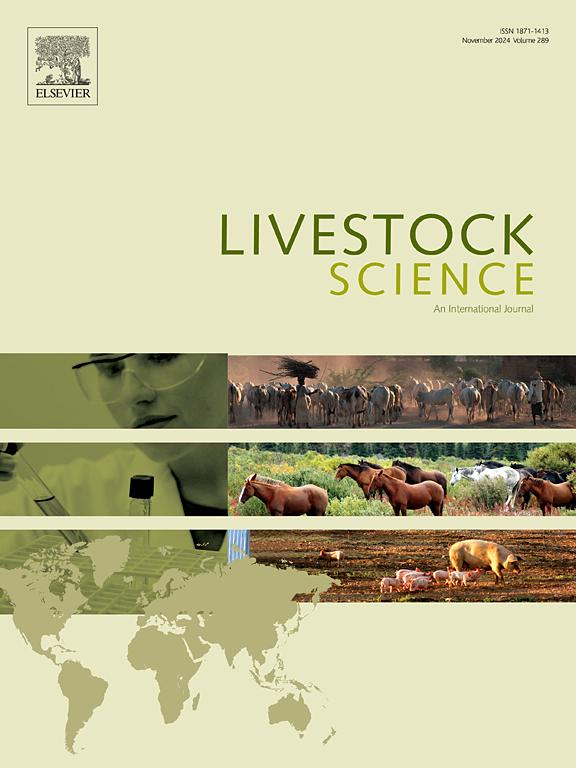益生菌混合料对绵羊瘤胃发酵、营养物质消化率和血液生化的影响
IF 1.9
3区 农林科学
Q2 AGRICULTURE, DAIRY & ANIMAL SCIENCE
引用次数: 0
摘要
近年来,反刍动物对甲烷排放的重要贡献受到了全球的广泛关注。虽然已经实施了饮食策略来缓解这一问题,但益生菌因其作为可持续、有效和环保的解决方案的潜力而越来越引起研究兴趣。因此,本研究考察了一种专有的益生菌混合物(ABLB),无论是单独使用还是与酿酒酵母(SC)联合使用,对绵羊瘤胃特征、营养物质消化率和血液生化参数的影响。实验动物饲喂基础饲粮,或每天添加1 g/只含嗜酸乳杆菌、保加利亚乳杆菌、地衣芽孢杆菌和两歧双歧杆菌(1:1:1)的益生菌混合物,浓度分别为2 × 10⁹CFU/g (ABLB2)和4 × 10⁹CFU/g (ABLB4),分别为第2和第3个饲粮处理。第4组(ABLB2+SC)和第5组(ABLB4+SC)饲粮处理由相同浓度的细菌混合物和SC (1 g/只/d)组成。益生菌补充显著(P <;0.05)显著降低了瘤胃氨氮(NH3-N)浓度和pH;0.05)提高了总挥发性脂肪酸(TVFA)浓度、微生物粗蛋白(MCP)产量和原虫数量,其中以ABLB2+SC组效果最为显著。与对照组相比,显著改善(P <;ABLB2+SC对试验饲粮干物质(DM)、粗纤维(CF)、粗蛋白质(CP)和粗脂肪(EE)的消化率以及总可消化营养物质(TDN)、淀粉值(SV)和可消化粗蛋白质(DCP)(%)的消化率均有显著影响(0.05)。此外,与基础饲粮相比,所有益生菌补充剂均显著提高了血清蛋白和葡萄糖浓度,同时显著降低了血清尿素、肌酐、天冬氨酸转氨酶(AST)、甘油三酯和胆固醇(P <;0.05)。本研究强调了在绵羊营养中添加混合益生菌在增强瘤胃功能、改善血液健康和优化养分利用方面的潜力。本文章由计算机程序翻译,如有差异,请以英文原文为准。
Impact of probiotic blend on rumen fermentation, nutrient digestibility, and blood biochemistry in sheep
The significant contribution of ruminants to methane emissions has received considerable global attention in recent years. While dietary strategies have been implemented to mitigate this issue, probiotics have increasingly attracted research interest due to their potential as sustainable, effective, and eco-friendly solutions. Hence, the current study examines the potential of a proprietary probiotic blend (ABLB), both alone and in combination with Saccharomyces cerevisiae (SC), on rumen characteristics, nutrient digestibility, and blood biochemical parameters in sheep. Animals were fed a basal diet or supplemented daily with 1 g/animal of a probiotics blend containing Lactobacillus acidophilus, Lactobacillus bulgaricus, Bacillus licheniformis, and Bifidobacterium bifidum (1:1:1:1) at two concentrations: 2 × 10⁹ CFU/g (ABLB2) and 4 × 10⁹ CFU/g (ABLB4), representing the 2nd and 3rd dietary treatments, respectively. The 4th (ABLB2+SC) and 5th (ABLB4+SC) dietary treatments consisted of the bacterial blend at the same two concentrations combined with SC (1 g/animal/day). Probiotic supplementation significantly (P < 0.05) decreased ruminal ammonia-nitrogen (NH3-N) concentrations and pH, while significantly (P < 0.05) increasing total volatile fatty acid (TVFA) concentration, microbial crude protein (MCP) production, and protozoal counts, with the most pronounced effects observed in the ABLB2+SC group. Compared to the control group, significant improvements (P < 0.05) were observed with ABLB2+SC in the digestibility of dry matter (DM), crude fiber (CF), crude protein (CP), and ether extract (EE), as well as in the total digestible nutrients (TDN), starch value (SV), and digestible crude protein (DCP) (%) values of the tested diets. Additionally, all probiotic supplements significantly increased serum protein and glucose concentrations, while significantly decreasing serum urea, creatinine, aspartate aminotransferase (AST), triglycerides, and cholesterol compared with the basal diet (P < 0.05). This study underscores the potential of a blended probiotic supplementation in sheep nutrition to enhance rumen function, improve blood health, and optimize nutrient utilization.
求助全文
通过发布文献求助,成功后即可免费获取论文全文。
去求助
来源期刊

Livestock Science
农林科学-奶制品与动物科学
CiteScore
4.30
自引率
5.60%
发文量
237
审稿时长
3 months
期刊介绍:
Livestock Science promotes the sound development of the livestock sector by publishing original, peer-reviewed research and review articles covering all aspects of this broad field. The journal welcomes submissions on the avant-garde areas of animal genetics, breeding, growth, reproduction, nutrition, physiology, and behaviour in addition to genetic resources, welfare, ethics, health, management and production systems. The high-quality content of this journal reflects the truly international nature of this broad area of research.
 求助内容:
求助内容: 应助结果提醒方式:
应助结果提醒方式:


